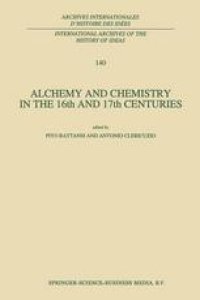
Ebook: Alchemy and Chemistry in the 16th and 17th Centuries
- Genre: Chemistry
- Tags: History, Chemistry/Food Science general, History of Medicine, Modern Philosophy
- Series: International Archives of the History of Ideas / Archives Internationales D’Histoire des Idées 140
- Year: 1994
- Publisher: Springer Netherlands
- Edition: 1
- Language: English
- pdf
The present volume owes its ongm to a Colloquium on "Alchemy and Chemistry in the Sixteenth and Seventeenth Centuries", held at the Warburg Institute on 26th and 27th July 1989. The Colloquium focused on a number of selected themes during a closely defined chronological interval: on the relation of alchemy and chemistry to medicine, philosophy, religion, and to the corpuscular philosophy, in the sixteenth and seventeenth centuries. The relations between Medicina and alchemy in the Lullian treatises were examined in the opening paper by Michela Pereira, based on researches on unpublished manuscript sources in the period between the 14th and 17th centuries. It is several decades since the researches of R.F. Multhauf gave a prominent role to Johannes de Rupescissa in linking medicine and alchemy through the concept of a quinta essentia. Michela Pereira explores the significance of the Lullian tradition in this development and draws attention to the fact that the early Paracelsians had themselves recognized a family resemblance between the works of Paracelsus and Roger Bacon's scientia experimentalis and, indeed, a continuity with the Lullian tradition.
The studies of sixteenth and seventeenth-century alchemy published in this volume were first presented as papers at a colloquium on `Alchemy and Chemistry' held at the Warburg Institute in 1989. The aim of the colloquium was to examine alchemy not as a self-contained tradition, but as an activity intimately connected with chemistry, medicine, philosophy and religion. The wide range of topics discussed by the different contributors shows clearly that a true understanding of alchemical texts demands that they be considered not only as a component of the pre-history of experimental science, but as manifestations of the very different forms of religious belief and philosophical views of nature held by the alchemists. Though alchemy has been widely regarded as the mere precursor of early chemistry, it is evident that the two disciplines in fact coexisted and were in certain cases practised independently. The chemical interpretation of nature is thus seen to occupy a central position in the philosophical and religious, as well as the scientific culture of the early-modern period. It is also essential to an understanding of human physiology and medicine and the early development of the corpuscular philosophy. Such a wide-ranging approach to chemical and alchemical studies aims to place them in their widest possible historical and philosophical context. The chronological and geographical limits of the present investigations were therefore designed to allow an in-depth study of a coherent body of works located within a short time span. The volume will therefore command the interest of both historians of science, as well as of students of intellectual and social history.